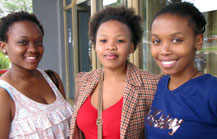Latest News Archive
Please select Category, Year, and then Month to display items
02 January 2025
|
Story Gerda-Marie van Rooyen
|
Photo Supplied
 Leading the research in South Africa is Prof Linus Franke from the Department of Soil, Crop and Climate Sciences.
Leading the research in South Africa is Prof Linus Franke from the Department of Soil, Crop and Climate Sciences.
Scientists are actively pursuing the successful breeding of diploid hybrid potatoes from inbred lines. This is expected to revolutionise potato breeding as it holds the key to rapid genetic progress. It will introduce new varieties for commercialisation through seed. Currently, existing potato variants have a gene that renders self-pollinated seeds infertile.
Prof Linus Franke, an academic in the Department of Soil, Crop and Climate Sciences at the UFS, is leading the research in South Africa. “This technology allows the production of genetically uniform potato seed that is easy to transport and largely disease-free.” He says this differs from conventional breeding whereby only vegetative propagation is possible due to tetraploid varieties in potatoes. It also risks carrying pests and diseases from one generation to the next – leading to the accumulation of pests and diseases with each round of multiplication.
Seed innovation
Prof Franke explains that Solynta BV, a seed company based in the Netherlands that produces potato varieties that can be grown from seed, has included South Africa in their research efforts because it is one of Africa’s largest producers and exporters. Through his academic relationship with Wageningen University and Research, a Dutch institution renowned for its agricultural endeavours and food production, the UFS became involved in researching hybrid potatoes grown from seed.
Diploid seeds containing two sets of chromosomes allow easier gene manipulation to increase predictability and speedier genetic progress. The breeding approach enables the incorporation of tolerance to pests, diseases, abiotic stresses (cold, heat, drought) and other desired genetic traits.
Although Prof Franke is optimistic about this research, he is not blind to disadvantages. “Potato seeds are tiny and have little energy reserves, making it harder to grow potatoes from seed than from tubers.” He says potatoes from seed will take longer to cultivate than tubers, as farmers need to grow plantlets from seeds first, adding six weeks to the growing period. “It is possible that commercial farmers can grow potatoes directly from seed. Alternatively, perhaps more likely, specialised growers will produce tubers of potatoes from seed; these tubers are then sold as seed tubers to other potato farmers, who then continue their normal practices of producing potatoes for the market from tubers.”
Financial benefits
Prof Franke says farmers have reason to get excited. “Seed potatoes will reduce input costs, as varieties with enhanced tolerance to pests and diseases require less pesticides. Planting one hectare of potatoes requires three to four tonnes of potato tubers, but only one 25 g packet of potato seeds.” Since potatoes are a more valuable commodity than maize, this technology might also increase farmers’ income potential.
Almost there…
2012-11-12
 |
First-year students Lindokuhle Sibisi, Zamokuhle Zule and Tabisa Tandathu are looking forward to start their vacation. The last date for exams is 17 November 2012 and students writing the additional opportunity exams will still be on our Campuses until 8 December.
Photo: Amanda Tongha
12 November 2012 |
The Year-end exams will come to an end this week, with more Kovsie students returning home to start their vacation. The final date for exams is 17 November 2012. Students who were unable to write at the first opportunity due to illness or other obligations, as well as those wanting to improve their marks, will have another opportunity with the supplementary opportunity exams starting on 26 November 2012. The final date for these exams is 8 December 2012.
Ian Hartley, a third-year student in Social Sciences, is one of the students who are still on the Bloemfontein Campus. Ian writes his final paper on Friday and says he is looking forward to the holidays. He will leave for Port Elizabeth in December to attend the South African Universities’ cricket tournament.
Ntheboheng Mopeli is also still on Campus. The third-year LLB student will write her two final papers this week.
Tabisa Tandathu, a first-year BSc student, wrote her final paper this week and will still be on Campus for another week before returning to her home town in the Eastern Cape. “I look forward to spending time with my family.”